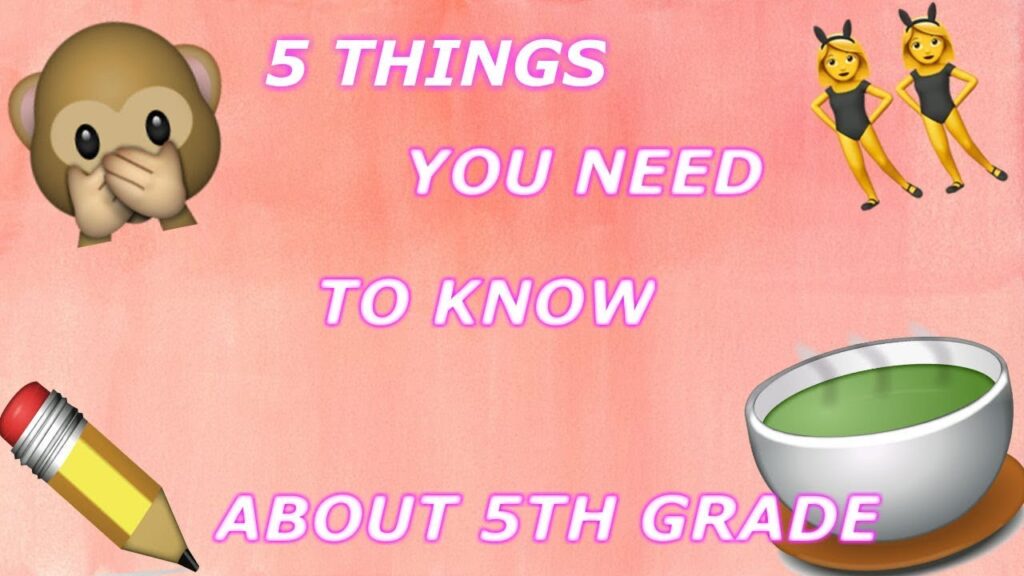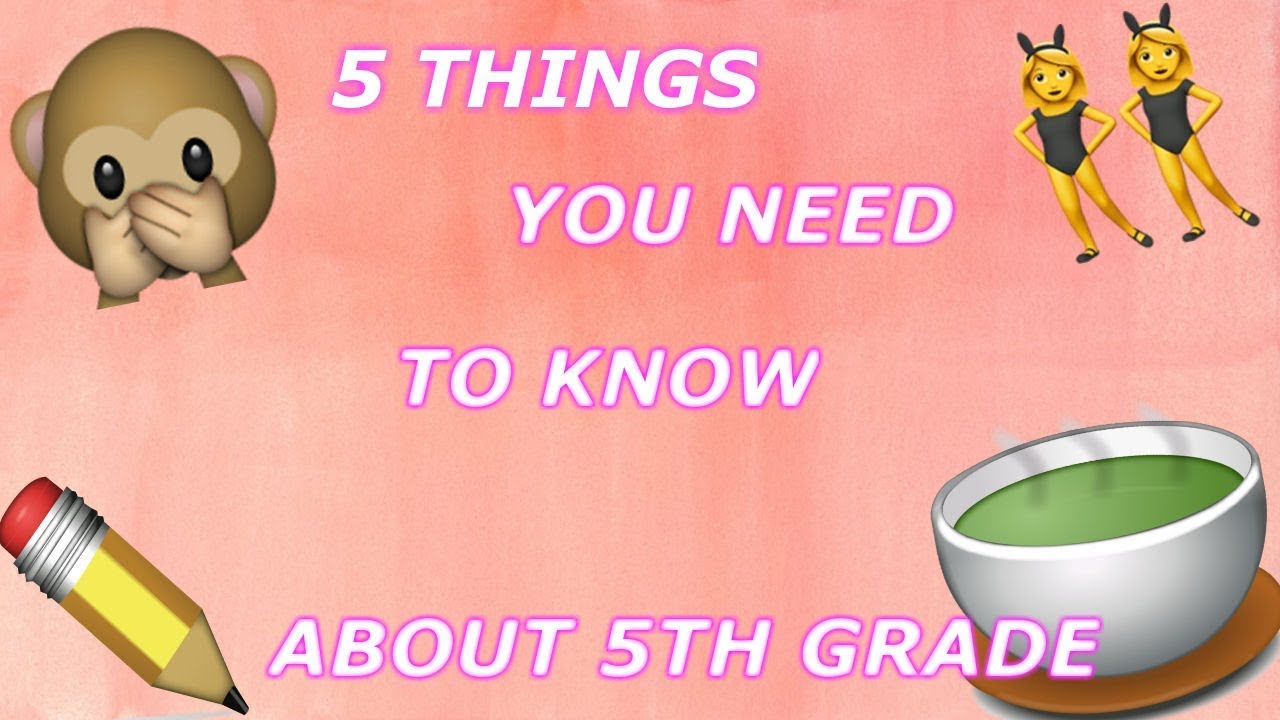
What Should a 5th Grader Know? A Comprehensive Guide for Parents and Educators
Fifth grade marks a significant transition in a child’s academic journey. As students prepare to enter middle school, the curriculum becomes more challenging, and the expectations increase. Parents and educators often wonder, “What should a 5th grader know?” This comprehensive guide outlines the key academic, social, and emotional milestones 5th graders are typically expected to achieve.
Academic Expectations for 5th Graders
The 5th-grade curriculum is designed to build upon previous knowledge and prepare students for more advanced concepts. Core subjects such as reading, writing, mathematics, science, and social studies are emphasized. Let’s delve into each of these areas:
Reading Comprehension
By 5th grade, students should be proficient readers capable of comprehending complex texts. They should be able to identify the main idea, supporting details, and author’s purpose. Inferential thinking, the ability to draw conclusions and make predictions based on textual evidence, is also crucial.
- Reading Fluency: Students should read at a pace that allows for comprehension.
- Vocabulary: A broad vocabulary is essential for understanding nuanced language.
- Text Analysis: Students should be able to analyze different genres, including fiction, non-fiction, and poetry.
Writing Skills
Writing in 5th grade involves developing clear and coherent essays, reports, and narratives. Students should be able to organize their thoughts, use proper grammar and punctuation, and cite sources appropriately. They should also be learning to write different types of texts, such as persuasive essays, informative reports, and creative stories. A key part of determining “what should a 5th grader know” is their writing ability.
- Essay Structure: Introduction, body paragraphs, and conclusion.
- Grammar and Punctuation: Correct usage of tenses, pronouns, and punctuation marks.
- Research Skills: Gathering information from reliable sources and citing them accurately.
Mathematical Concepts
Mathematics in 5th grade covers a range of topics, including fractions, decimals, geometry, and algebra. Students should be able to perform operations with fractions and decimals, solve multi-step word problems, and understand basic geometric concepts. Pre-algebraic thinking, such as identifying patterns and solving simple equations, is also introduced. Understanding the math concepts is a big part of knowing “what should a 5th grader know“.
- Fractions and Decimals: Addition, subtraction, multiplication, and division.
- Geometry: Area, perimeter, volume, and properties of shapes.
- Algebraic Thinking: Identifying patterns, solving simple equations.
Science Education
Science in 5th grade typically covers topics such as ecosystems, the human body, weather, and the solar system. Students should be able to conduct experiments, collect data, and draw conclusions based on their findings. Critical thinking and problem-solving skills are emphasized. Understanding basic scientific principles is another component of “what should a 5th grader know“.
- Scientific Method: Observation, hypothesis, experimentation, analysis, conclusion.
- Life Science: Ecosystems, food chains, and the human body.
- Earth Science: Weather patterns, the solar system, and natural resources.
Social Studies Curriculum
Social studies in 5th grade often focuses on United States history, geography, and civics. Students should be able to understand historical events, analyze primary and secondary sources, and discuss the role of citizens in a democracy. A grasp of these historical and civic concepts is an important aspect of “what should a 5th grader know“.
- U.S. History: Exploration, colonization, and the American Revolution.
- Geography: Map skills, regions of the United States, and global awareness.
- Civics: The Constitution, branches of government, and civic responsibilities.
Social and Emotional Development
Beyond academics, social and emotional development is equally important. Fifth graders are navigating complex social relationships and learning to manage their emotions. Here are some key social and emotional milestones:
Social Skills
Developing strong social skills is essential for building positive relationships with peers and adults. Fifth graders should be able to communicate effectively, collaborate on group projects, and resolve conflicts peacefully.
- Communication: Expressing thoughts and feelings clearly and respectfully.
- Collaboration: Working effectively with others to achieve a common goal.
- Conflict Resolution: Addressing disagreements in a constructive manner.
Emotional Regulation
Learning to manage emotions is crucial for success in school and life. Fifth graders should be able to identify their emotions, understand the triggers, and develop coping strategies for dealing with stress and frustration. Being able to regulate their emotions is a key part of “what should a 5th grader know“.
- Self-Awareness: Recognizing one’s own emotions and their impact on behavior.
- Stress Management: Developing healthy coping mechanisms for dealing with stress.
- Resilience: Bouncing back from setbacks and learning from mistakes.
Empathy and Perspective-Taking
Empathy, the ability to understand and share the feelings of others, is a vital social skill. Fifth graders should be able to consider different perspectives and show compassion for others. Understanding others’ feelings is an important component of “what should a 5th grader know“.
- Perspective-Taking: Considering situations from another person’s point of view.
- Compassion: Showing concern and kindness towards others.
- Respect: Treating others with consideration and valuing their differences.
Practical Life Skills for 5th Graders
In addition to academic and social-emotional skills, it’s beneficial for 5th graders to start developing practical life skills. These skills can foster independence and responsibility. Many parents and educators consider these essential parts of “what should a 5th grader know“.
Time Management
Fifth graders should begin learning to manage their time effectively. This includes planning their schedules, prioritizing tasks, and meeting deadlines. Time management skills are crucial for academic success and future endeavors.
Organizational Skills
Being organized is essential for keeping track of assignments, materials, and belongings. Fifth graders should learn to use organizational tools such as planners, folders, and checklists. Good organization contributes greatly to academic performance and general efficiency.
Basic Financial Literacy
Introducing basic financial concepts can help 5th graders develop responsible spending habits. This includes understanding the value of money, making informed purchasing decisions, and saving for future goals. Financial literacy is a valuable life skill that can benefit them throughout their lives.
Digital Literacy
In today’s digital age, it’s crucial for 5th graders to develop digital literacy skills. This includes using technology responsibly, evaluating online information, and protecting their privacy. Digital literacy is an increasingly important aspect of education and personal development. The importance of digital literacy contributes to “what should a 5th grader know“.
Addressing Learning Differences
It’s important to recognize that not all 5th graders develop at the same pace. Some students may excel in certain areas while struggling in others. Educators and parents should work together to identify and address learning differences. Understanding individual learning styles and providing appropriate support are essential for student success.
Individualized Education Plans (IEPs)
For students with identified learning disabilities, an IEP can provide tailored instruction and accommodations to meet their specific needs. Parents and educators collaborate to develop an IEP that outlines goals, strategies, and support services.
Differentiated Instruction
Differentiated instruction involves adapting teaching methods and materials to meet the diverse learning needs of students. This can include providing different levels of support, offering choices in assignments, and using various instructional strategies. Differentiated instruction ensures that all students have the opportunity to succeed.
The Role of Parents and Educators
Parents and educators play a crucial role in supporting the development of 5th graders. Open communication, collaboration, and a shared commitment to student success are essential. Parents can support their children’s learning by providing a supportive home environment, encouraging reading, and helping with homework. Educators can provide engaging instruction, assess student progress, and communicate effectively with parents. Determining “what should a 5th grader know” is a collaborative effort.
Creating a Supportive Learning Environment
A supportive learning environment fosters a sense of belonging, encourages risk-taking, and celebrates successes. Parents and educators can create a positive atmosphere by providing encouragement, offering constructive feedback, and promoting a growth mindset.
Encouraging a Love of Learning
Fostering a love of learning is essential for lifelong success. Parents and educators can encourage curiosity, provide opportunities for exploration, and celebrate intellectual achievements. When students are motivated to learn, they are more likely to excel academically and pursue their passions.
Conclusion
What should a 5th grader know? The answer encompasses a wide range of academic, social, emotional, and practical life skills. By focusing on these key areas, parents and educators can help 5th graders develop into well-rounded individuals prepared for the challenges and opportunities of middle school and beyond. Continual support and guidance are key to helping them achieve their full potential. Understanding these expectations is vital for preparing students for future success, and “what should a 5th grader know” is a question that should be revisited regularly.
[See also: Effective Study Habits for Middle School Students]
[See also: How to Help Your Child with Reading Comprehension]
[See also: Building Social Skills in Children]

